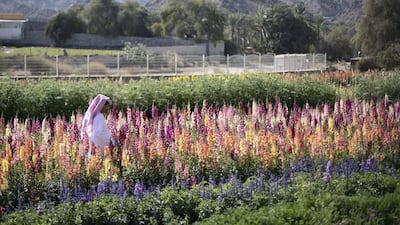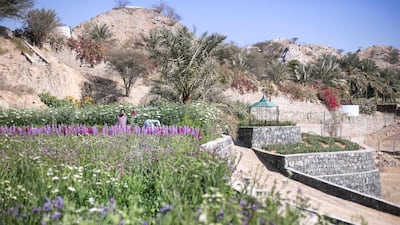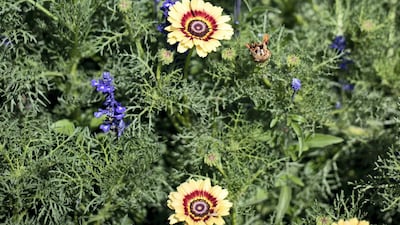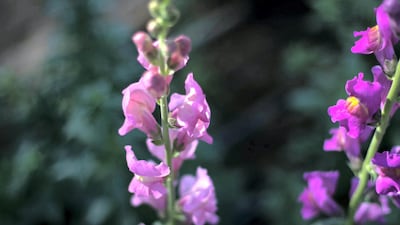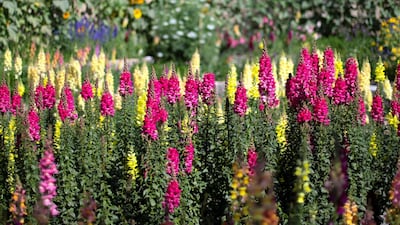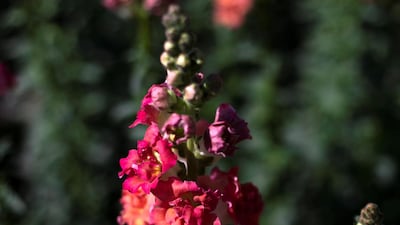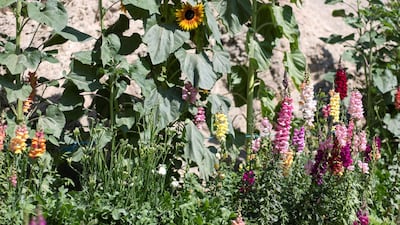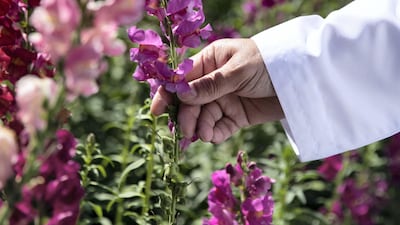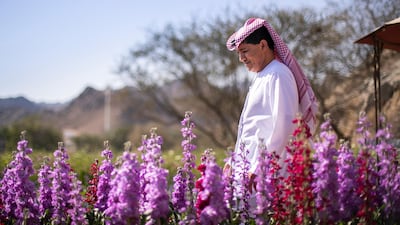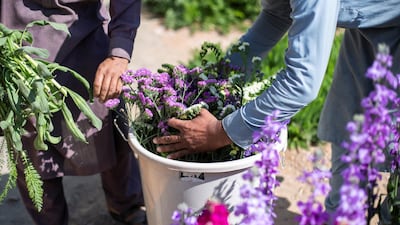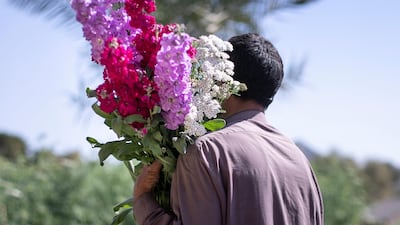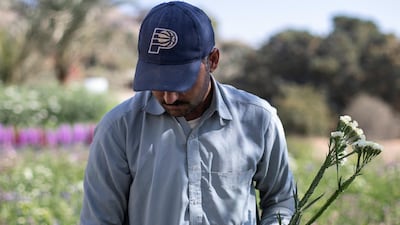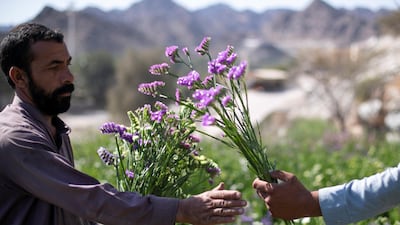A new food safety standards system will be introduced in the UAE in the next two months, under a Ministry of Climate Change and Environment initiative.
Minister of Climate Change and Environment Abdullah Al Nuaimi said the rules would ensure only top-rated food products that complied with the highest international standards could enter the country.
Mr Al Nuaimi on Monday told The National that food previously imported into the UAE fell into three categories – A, B and C – with A representing the highest quality.
“Now only food that falls into the A category will be allowed to enter the UAE,” he said.
This isn't about planting food for the good times - it's for emergencies
His comments came as the country launched an initiative to encourage more young Emiratis to consider careers in agriculture.
Authorities are to build five centres where Emiratis can spend 16 months learning about the sector.
It is hoped hundreds of Emiratis will be trained up to become experts in agriculture within a few years.
The Covid-19 pandemic sharpened awareness of how crucial food security is to the UAE, which imports around 90 per cent of its food needs.
“Covid-19 is the reason [the project is being launched]," said Mr Al Nuaimi. "We had time during the pandemic to assess the threat that could be posed by another pandemic, or a disaster in another country, to our food supply.”
The first of five centres – known as "youth food security stations" – will be built in Abu Dhabi and more will follow.
Anyone interested would spend up to 18 months at a centre to learn about animal and crop agriculture, beekeeping and aquaculture. Further details about the plan and the new food standards are expected in the coming weeks
Coronavirus has focused the world's attention on food supplies.
Mariam Al Mheiri, the Minister of State for Food Security, said last year that the pandemic forced the UAE to assess its food supply chain after the country experienced some initial disruption.
Ms Al Mheiri said authorities acted quickly to ensure people had access to vital products, while the government's policy in supporting agri-tech companies to increase local food supply helped.
Over the past few years there has been a large increase in the number of UAE companies producing food, including farmed fish in Jebel Ali and leafy greens grown under LEDs in Abu Dhabi.
This project aims to further support these trends.
While the initial placing at one of the stations will last for 18 months, Mr Al Nuaimi said the plan was for Emirati youths to spend much longer than that in the industry.
“It’s not a year and a half – it’s a career for the youth. We are designing agriculture into the future and we want people taking part to establish their own stations and own businesses," said Mr Al Nuaimi. “This isn’t about planting food for the good times – it’s for emergencies,” he said.
“In a few years we hope to have 300 people who would have taken part and will be experts in agriculture. That would be a huge help to future sustainability.”
Ms Al Mheiri also backed the initiative.
“As a source of hope for a better future, youth empowerment and capacity building is a key element of advancing the UAE’s vital priorities, including food security,” she said.
“To this end, the youth food security stations will engage Emirati youth and harness their power to create innovative food projects.”
In pictures: the blooming UAE flower farm in Fujairah
INDIA'S%20TOP%20INFLUENCERS
%3Cp%3E%3Cstrong%3EBhuvan%20Bam%3C%2Fstrong%3E%3Cbr%3E%3Ca%20href%3D%22https%3A%2F%2Fwww.instagram.com%2Fbhuvan.bam22%2F%3Fhl%3Den%22%20target%3D%22_self%22%3EInstagram%3C%2Fa%3E%20followers%3A%2016.1%20million%3Cbr%3EBhuvan%20Bam%20is%20a%2029-year-old%20comedian%20and%20actor%20from%20Delhi%2C%20who%20started%20out%20with%20YouTube%20channel%2C%20%E2%80%9CBB%20Ki%20Vines%E2%80%9D%20in%202015%2C%20which%20propelled%20the%20social%20media%20star%20into%20the%20limelight%20and%20made%20him%20sought-after%20among%20brands.%3Cbr%3E%3Cstrong%3EKusha%20Kapila%3C%2Fstrong%3E%3Cbr%3E%3Ca%20href%3D%22https%3A%2F%2Fwww.instagram.com%2Fkushakapila%2F%3Fhl%3Den%22%20target%3D%22_self%22%3EInstagram%3C%2Fa%3E%20followers%3A%203.1%20million%3Cbr%3EKusha%20Kapila%20is%20a%20fashion%20editor%20and%20actress%2C%20who%20has%20collaborated%20with%20brands%20including%20Google.%20She%20focuses%20on%20sharing%20light-hearted%20content%20and%20insights%20into%20her%20life%20as%20a%20rising%20celebrity.%3Cbr%3E%3Cstrong%3EDiipa%20Khosla%3C%2Fstrong%3E%3Cbr%3E%3Ca%20href%3D%22https%3A%2F%2Fwww.instagram.com%2Fdiipakhosla%2F%3Fhl%3Den%22%20target%3D%22_self%22%3EInstagram%3C%2Fa%3E%20followers%3A%201.8%20million%3Cbr%3EDiipa%20Khosla%20started%20out%20as%20a%20social%20media%20manager%20before%20branching%20out%20to%20become%20one%20of%20India's%20biggest%20fashion%20influencers%2C%20with%20collaborations%20including%20MAC%20Cosmetics.%3Cbr%3E%3Cstrong%3EKomal%20Pandey%3Cbr%3E%3C%2Fstrong%3E%3Ca%20href%3D%22https%3A%2F%2Fwww.instagram.com%2Fkomalpandeyofficial%2F%3Fhl%3Den%22%20target%3D%22_self%22%3EInstagram%3C%2Fa%3E%20followers%3A%201.8%20million%3Cbr%3EKomal%20Pandey%20is%20a%20fashion%20influencer%20who%20has%20partnered%20with%20more%20than%20100%20brands%2C%20including%20Olay%20and%20smartphone%20brand%20Vivo%20India.%3Cbr%3E%3Cstrong%3ENikhil%20Sharma%3C%2Fstrong%3E%3Cbr%3E%3Ca%20href%3D%22https%3A%2F%2Fwww.instagram.com%2Fnikkkhil%2F%3Fhl%3Den%22%20target%3D%22_self%22%3EInstagram%3C%2Fa%3E%20followers%3A%201.4%20million%3Cbr%3ENikhil%20Sharma%20from%20Mumbai%20began%20his%20online%20career%20through%20vlogs%20about%20his%20motorcycle%20trips.%20He%20has%20become%20a%20lifestyle%20influencer%20and%20has%20created%20his%20own%20clothing%20line.%3Cbr%3E%3Cem%3ESource%3A%20Hireinfluence%2C%20various%3C%2Fem%3E%3Cbr%3E%3C%2Fp%3E%0A
The%20Killer
%3Cp%3E%3Cstrong%3EDirector%3A%C2%A0%3C%2Fstrong%3EDavid%20Fincher%3C%2Fp%3E%0A%3Cp%3E%3Cstrong%3EStars%3A%C2%A0%3C%2Fstrong%3EMichael%20Fassbender%2C%20Tilda%20Swinton%2C%20Charles%20Parnell%3C%2Fp%3E%0A%3Cp%3E%3Cstrong%3ERating%3A%3C%2Fstrong%3E%204%2F5%C2%A0%3C%2Fp%3E%0A
THE CLOWN OF GAZA
Director: Abdulrahman Sabbah
Starring: Alaa Meqdad
Rating: 4/5
Our legal consultant
Name: Hassan Mohsen Elhais
Position: legal consultant with Al Rowaad Advocates and Legal Consultants.
Key facilities
- Olympic-size swimming pool with a split bulkhead for multi-use configurations, including water polo and 50m/25m training lanes
- Premier League-standard football pitch
- 400m Olympic running track
- NBA-spec basketball court with auditorium
- 600-seat auditorium
- Spaces for historical and cultural exploration
- An elevated football field that doubles as a helipad
- Specialist robotics and science laboratories
- AR and VR-enabled learning centres
- Disruption Lab and Research Centre for developing entrepreneurial skills
Living in...
This article is part of a guide on where to live in the UAE. Our reporters will profile some of the country’s most desirable districts, provide an estimate of rental prices and introduce you to some of the residents who call each area home.
'Munich: The Edge of War'
Director: Christian Schwochow
Starring: George MacKay, Jannis Niewohner, Jeremy Irons
Rating: 3/5
MATCH DETAILS
Barcelona 0
Slavia Prague 0
KILLING OF QASSEM SULEIMANI
Seemar’s top six for the Dubai World Cup Carnival:
1. Reynaldothewizard
2. North America
3. Raven’s Corner
4. Hawkesbury
5. New Maharajah
6. Secret Ambition
Killing of Qassem Suleimani
More coverage from the Future Forum
Company profile
Date started: January, 2014
Founders: Mike Dawson, Varuna Singh, and Benita Rowe
Based: Dubai
Sector: Education technology
Size: Five employees
Investment: $100,000 from the ExpoLive Innovation Grant programme in 2018 and an initial $30,000 pre-seed investment from the Turn8 Accelerator in 2014. Most of the projects are government funded.
Partners/incubators: Turn8 Accelerator; In5 Innovation Centre; Expo Live Innovation Impact Grant Programme; Dubai Future Accelerators; FHI 360; VSO and Consult and Coach for a Cause (C3)
The five pillars of Islam
1. Fasting
2. Prayer
3. Hajj
4. Shahada
5. Zakat
Killing of Qassem Suleimani
Zayed Sustainability Prize
Killing of Qassem Suleimani
STAY%2C%20DAUGHTER
%3Cp%3E%3Cstrong%3EAuthor%3A%20%3C%2Fstrong%3EYasmin%20Azad%3C%2Fp%3E%0A%3Cp%3E%3Cstrong%3EPublisher%3A%20%3C%2Fstrong%3ESwift%20Press%3C%2Fp%3E%0A%3Cp%3E%3Cstrong%3EAvailable%3A%20%3C%2Fstrong%3ENow%3C%2Fp%3E%0A
Emergency
Director: Kangana Ranaut
Stars: Kangana Ranaut, Anupam Kher, Shreyas Talpade, Milind Soman, Mahima Chaudhry
Rating: 2/5
GAC GS8 Specs
Engine: 2.0-litre 4cyl turbo
Power: 248hp at 5,200rpm
Torque: 400Nm at 1,750-4,000rpm
Transmission: 8-speed auto
Fuel consumption: 9.1L/100km
On sale: Now
Price: From Dh149,900
Married Malala
Malala Yousafzai is enjoying married life, her father said.
The 24-year-old married Pakistan cricket executive Asser Malik last year in a small ceremony in the UK.
Ziauddin Yousafzai told The National his daughter was ‘very happy’ with her husband.
More from Rashmee Roshan Lall
What sanctions would be reimposed?
Under ‘snapback’, measures imposed on Iran by the UN Security Council in six resolutions would be restored, including:
- An arms embargo
- A ban on uranium enrichment and reprocessing
- A ban on launches and other activities with ballistic missiles capable of delivering nuclear weapons, as well as ballistic missile technology transfer and technical assistance
- A targeted global asset freeze and travel ban on Iranian individuals and entities
- Authorisation for countries to inspect Iran Air Cargo and Islamic Republic of Iran Shipping Lines cargoes for banned goods
Asia Cup 2018 Qualifier
Sunday's results:
- UAE beat Malaysia by eight wickets
- Nepal beat Singapore by four wickets
- Oman v Hong Kong, no result
Tuesday fixtures:
- Malaysia v Singapore
- UAE v Oman
- Nepal v Hong Kong
UAE currency: the story behind the money in your pockets
Abu Dhabi traffic facts
Drivers in Abu Dhabi spend 10 per cent longer in congested conditions than they would on a free-flowing road
The highest volume of traffic on the roads is found between 7am and 8am on a Sunday.
Travelling before 7am on a Sunday could save up to four hours per year on a 30-minute commute.
The day was the least congestion in Abu Dhabi in 2019 was Tuesday, August 13.
The highest levels of traffic were found on Sunday, November 10.
Drivers in Abu Dhabi lost 41 hours spent in traffic jams in rush hour during 2019
The burning issue
The internal combustion engine is facing a watershed moment – major manufacturer Volvo is to stop producing petroleum-powered vehicles by 2021 and countries in Europe, including the UK, have vowed to ban their sale before 2040. The National takes a look at the story of one of the most successful technologies of the last 100 years and how it has impacted life in the UAE.
Read part four: an affection for classic cars lives on
Read part three: the age of the electric vehicle begins
Read part one: how cars came to the UAE
Killing of Qassem Suleimani
The years Ramadan fell in May
More on Quran memorisation:
More on animal trafficking
The five pillars of Islam
More on Quran memorisation:
Global Fungi Facts
• Scientists estimate there could be as many as 3 million fungal species globally
• Only about 160,000 have been officially described leaving around 90% undiscovered
• Fungi account for roughly 90% of Earth's unknown biodiversity
• Forest fungi help tackle climate change, absorbing up to 36% of global fossil fuel emissions annually and storing around 5 billion tonnes of carbon in the planet's topsoil
Labour dispute
The insured employee may still file an ILOE claim even if a labour dispute is ongoing post termination, but the insurer may suspend or reject payment, until the courts resolve the dispute, especially if the reason for termination is contested. The outcome of the labour court proceedings can directly affect eligibility.
- Abdullah Ishnaneh, Partner, BSA Law
More from Neighbourhood Watch
The Brutalist
Director: Brady Corbet
Stars: Adrien Brody, Felicity Jones, Guy Pearce, Joe Alwyn
Rating: 3.5/5
Killing of Qassem Suleimani
More on animal trafficking
